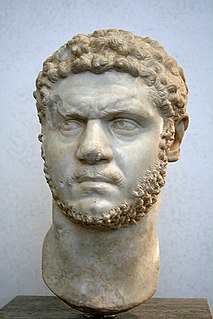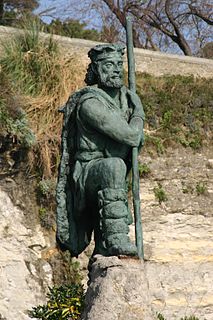Related Research Articles

Hadrian was Roman emperor from 117 to 138. He was born into a Roman Italo-Hispanic family, which settled in Spain from the Italian city of Atri in Picenum. His father was of senatorial rank and was a first cousin of Emperor Trajan. Hadrian married Trajan's grand-niece Vibia Sabina early in his career, before Trajan became emperor and possibly at the behest of Trajan's wife Pompeia Plotina. Plotina and Trajan's close friend and adviser Lucius Licinius Sura were well disposed towards Hadrian. When Trajan died, his widow claimed that he had nominated Hadrian as emperor immediately before his death.

Elagabalus, also called Heliogabalus and officially known as Antoninus, was Roman emperor from 218 to 222, while he was still a teenager. His short reign was conspicuous for sex scandals and religious controversy. A close relative to the Severan dynasty, he came from a prominent Arab family in Emesa (Homs), Syria, where since his early youth he served as head priest of the sun god Elagabal. After the death of his cousin the emperor Caracalla, Elagabalus was raised to the principate at 14 years of age in an army revolt instigated by his grandmother Julia Maesa against Caracalla's short-lived successor, Macrinus. As a private citizen, he was probably named Varius Avitus Bassianus. Upon becoming emperor he took the name Marcus Aurelius Antoninus, and only posthumously became known by the Latinised name of his god.

Marcus Aurelius Antoninus was a Roman emperor from 161 to 180 and a Stoic philosopher. He was the last of the rulers known as the Five Good Emperors, and the last emperor of the Pax Romana, an age of relative peace and stability for the Roman Empire. He served as Roman consul in 140, 145, and 161.

Trajan was Roman emperor from 98 to 117. Officially declared by the Senate optimus princeps, Trajan is remembered as a successful soldier-emperor who presided over the second-greatest military expansion in Roman history, after Augustus, leading the empire to attain its maximum territorial extent by the time of his death. He is also known for his philanthropic rule, overseeing extensive public building programs and implementing social welfare policies, which earned him his enduring reputation as the second of the Five Good Emperors who presided over an era of peace within the Empire and prosperity in the Mediterranean world.

Aulus Vitellius was Roman emperor for eight months, from 19 April to 20 December AD 69. Vitellius was proclaimed emperor following the quick succession of the previous emperors Galba and Otho, in a year of civil war known as the Year of the Four Emperors. Vitellius was the first to add the honorific cognomen Germanicus to his name instead of Caesar upon his accession. Like his direct predecessor, Otho, Vitellius attempted to rally public support to his cause by honoring and imitating Nero who remained widely popular in the empire.

Caracalla, formally known as Marcus Aurelius Antoninus, was Roman emperor from 198 to 217. He was a member of the Severan dynasty, the elder son of Septimius Severus and Julia Domna. Co-ruler with his father from 198, he continued to rule with his brother Geta, emperor from 209, after their father's death in 211. His brother was murdered by the Praetorian Guard later that year, supposedly under orders from Caracalla himself, who then reigned afterwards as sole ruler of the Roman Empire. He found administration to be mundane, leaving those responsibilities to his mother, Julia Domna. Caracalla's reign featured domestic instability and external invasions by the Germanic peoples.

Titus Caesar Vespasianus was Roman emperor from 79 to 81. A member of the Flavian dynasty, Titus succeeded his father Vespasian upon his death.

Gordian I was Roman emperor for 21 days with his son Gordian II in 238, the Year of the Six Emperors. Caught up in a rebellion against the Emperor Maximinus Thrax, he was defeated by forces loyal to Maximinus, and he committed suicide after the death of his son.
Lucius Cassius Dio or Dio Cassius was a Roman statesman and historian of Greek origin. He published 80 volumes of the history on ancient Rome, beginning with the arrival of Aeneas in Italy. The volumes documented the subsequent founding of Rome, the formation of the Republic, and the creation of the Empire, up until 229 AD. Written in Ancient Greek over 22 years, Dio's work covers approximately 1,000 years of history. Many of his 80 books have survived intact, or as fragments, providing modern scholars with a detailed perspective on Roman history.

The Roman emperor was the ruler of the Roman Empire during the imperial period. The emperors used a variety of different titles throughout history. Often when a given Roman is described as becoming "emperor" in English, it reflects his taking of the title Augustus or Caesar. Another title often used was imperator, originally a military honorific. Early emperors also used the title Princeps Civitatis. Emperors frequently amassed republican titles, notably princeps senatus, consul, and pontifex maximus.

Julia Domna was Roman empress from 193 to 211 as the wife of Emperor Septimius Severus. She was born in Emesa in Roman Syria to an Arab family of priests of the deity Elagabalus. In 187, she married Severus, who at the time was governor of the Roman province of Gallia Lugdunensis. They had two sons, Caracalla and Geta. A civil war over the Roman throne broke out in 193, and shortly afterwards Severus declared himself emperor. The war ended in 197 with the defeat of the last of Severus's opponents.
The praetorian prefect was a high office in the Roman Empire. Originating as the commander of the Praetorian Guard, the office gradually acquired extensive legal and administrative functions, with its holders becoming the Emperor's chief aides. Under Constantine I, the office was much reduced in power and transformed into a purely civilian administrative post, while under his successors, territorially-defined praetorian prefectures emerged as the highest-level administrative division of the Empire. The prefects again functioned as the chief ministers of the state, with many laws addressed to them by name. In this role, praetorian prefects continued to be appointed by the Eastern Roman Empire until the reign of Heraclius in the 7th century AD, when wide-ranging reforms reduced their power and converted them to mere overseers of provincial administration. The last traces of the prefecture disappeared in the Byzantine Empire by the 840s.
The a rationibus was the secretary of finance in the Roman Empire and in charge of the imperial treasury, the fiscus. His responsibilities involved monitoring the state's revenues and expenditures and maintaining the accounts of the fiscus, giving the a rationibus considerable influence.

Corocotta is a local hero for Cantabrians and his story is passed down orally in Cantabrian families from the elder generations to the younger. According to Roman sources, he was a guerrilla warrior or bandit in Cantabria during the 1st century BC, who, according to Cassius Dio, raided Roman territory causing considerable depredation in the area. Dio says that Corocotta's depredations caused Augustus to offer a large reward for his capture. Corocotta himself came forward to receive it, impressing Augustus with his audacity. Dio is the only source for the story.

Lucius Volusius Maecianus was a Roman jurist, who advised the Emperor Antoninus Pius on legal matters, as well educating his son the future Marcus Aurelius in the subject. Originally of the equestrian class, Maecianus held a series of imperial offices culminating with prefect of Egypt in 161, when Marcus Aurelius adlected him inter praetorios, or with the rank of praetor, into the Roman Senate. Maecianus was suffect consul in an undetermined nundinium around AD 166.
Lucius Seius Strabo or Lucius Aelius Strabo was a prefect of the Roman imperial bodyguard, known as the Praetorian Guard, during the rule of the emperors Augustus and Tiberius. The length of Strabo's tenure as Praetorian prefect is unknown, but he held the position together with various colleagues until 15, after which he was appointed to the governorship of Egypt. With this career Strabo distinguished himself by attaining the two highest offices open to men of the equestrian class in the Roman Empire.
Aelius Antipater or Antipater of Hierapolis was a Greek sophist and rhetorician.
The aerarium militare was the military treasury of Imperial Rome. It was instituted by Augustus, the first Roman emperor, as a "permanent revenue source" for pensions (praemia) for veterans of the Imperial Roman army. The treasury derived its funding from new taxes, an inheritance tax and a sales tax, and regularized the ad hoc provisions for veterans that under the Republic often had involved socially disruptive confiscation of property.
Ab epistulis was the chancellor's office in the Roman Empire with responsibility for the emperor's correspondence. The office sent mandata (instructions) to provincial governors and other officials.
Quintus Marcius Dioga was a Roman eques who flourished during the reign of the emperor Septimius Severus and his sons. He was appointed to a series of imperial offices, including praefectus annonae,, and praefectus vigilum.
References
- ↑ Lara Peinado, Federico; Cabrero Piquero, Javier; Cordente Vaquero, Félix; Pino Cano, Juan Antonio (2009). Diccionario de instituciones de la Antigüedad (in Spanish) (1ª ed.). Fuenlabrada (Madrid): Ediciones Cátedra (Grupo Anaya, Sociedad Anónima). p. 13. ISBN 9788437626123 . Retrieved 19 April 2017.
- ↑ Dio 75, 15, 5
- ↑ Philostratus, VS, 2, 32
- 1 2 Millar 2005, p. 19.
- ↑ Varela Gil, Carlos (2007). El estatuto jurídico del empleado público en derecho romano (in Spanish). Universidad Autónoma de Madrid: Librería-Editorial Dykinson. p. 437. ISBN 9788498491036 . Retrieved 19 April 2017.
- 1 2 "Administración del emperador". Artehistoria (in Spanish). España. Retrieved 19 April 2017.
- ↑ Lomas Salmonte, Francisco Javier; López Barja de Quiroga, Pedro (2004). Historia de Roma (in Spanish). Madrid: Ediciones Akal. p. 704. ISBN 8446012251 . Retrieved 19 April 2017.
- ↑ Millar 2005, p. 17.